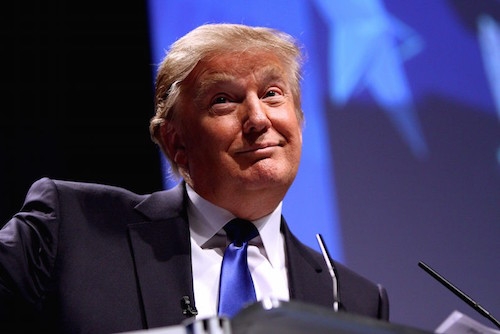United States President-elect Donald Trump has already made it clear that his administration will be far more friendly to fossil fuel companies than it will be to the environment, both with his appointment of noted climate change denier Myron Ebell to head up the EPA transition team, and with his stated desire to pull the United States out of the Paris Climate Agreement.
While Ebell’s appointment spells environmental disaster, it is Trump’s desire to withdraw from the Paris Agreement that could cripple the United States both environmentally and economically. And it is that second point – the economic impacts – that might actually have a chance of resonating with the American public.
The majority of Americans, regardless of political party affiliation, believe in the science that says that global warming is very real. In spite of this acceptance, Americans continue to elect climate change denying politicians, like Donald Trump. But changing the dynamic of the conversation about the environment into an economic argument could inspire more immediate action on climate change.
In fact, former French president Nikolas Sarkozy has already linked climate change to the economy by telling the press that if President-elect Donald Trump pulls out of the Paris Agreement, other signatories should impose a “carbon tax” on American imports. The tax, according to Sarkozy, could be anywhere between 1 and 3% of the total of the goods imported.
This tax may seem small, but it could put a very severe financial burden on American goods that would push them just out of price range for foreign consumers. Once American goods become less competitive overseas, prices in the United States will either go up in order to compensate for losses, or jobs will have to be cut to avoid financial losses at the companies. Both of those options are devastating for an already fragile economy.
This threat is very real, as Sarkozy could easily become the President of France once again in their upcoming elections. But it isn’t necessarily meant as a punishment; this threat is more than likely an incentive to keep the United States from pulling out of the agreement. And nobody understands that threat more than businesses operating in the United States.
The desire to withdraw from the Paris Climate Agreement is only a small part of Donald Trump’s anti-environmental leanings, and businesses are not happy about the prospects of operating in a country that outwardly denies the existence of climate change.
Joe Arvai, writing for The Conversation, lays out how businesses have already begun adapting to the threats of climate change in the United States:
As many businesses have discovered, decoupling economic progress from resource use and environmental decline can also be one of the biggest drivers of future success. In other words, money flows where sustainability grows.
Even before that, businesses – from airlines and auto manufacturers to the oil and gas industry – were beginning to recognize that their long-term viability would depend upon their ability to better account for the environmental costs associated with production. For example, the external environmental costs of 11 key industry sectors, including their upstream suppliers, increased by an estimated 50 percent from 2002 to 2010. This amounted to a loss of approximately 40 cents on every dollar in earnings across a diverse array of businesses, from beverage producers to manufacturers.
Arvai’s statement echoes what DeSmogBlog reported three years ago: that American corporations understand that climate change is bad for business. Here’s what I wrote for DeSmog in November 2013:
A recent study by the Carbon Disclosure Project shows that at least 70% of major businesses are concerned about the threats that climate change poses to their companies. 51% of the businesses contacted for the study said that climate change, specifically heavy rains and droughts, has already had a very large impact on operations, always in a negative way.
These aren’t mom and pop operations either. Massive corporations like Wal-Mart, Dell Computers, and L’Oreal are among those who have reported negative economic impacts from climate change related disasters.
The insurance industry, a group that stands to lose a lot of money in the next few decades as extreme weather becomes the norm, has been working for years to develop mitigation plans for climate change catastrophes. Several state insurance commissions already require insurance providers to include risks associated with climate change in their policies.
In October 2013, leaders at both the IMF and the World Bank addressed the issue of climate change for the first time. Their take on the issue is even more dire than the business community. Both groups focused solely on the economic impacts that we can expect, and their recommendations are among the most extreme that have ever been proposed, but they believe these are the necessary steps to take in order to avoid climate change-induced global economic collapse.
During Trump’s campaign, he repeatedly called for an end to the Obama administration’s alleged “hostility” towards fossil fuels, and he went as far as to say that he would cut $100 billion from renewable energy projects and environmental protection programs in the next eight years.
These campaign promises would devastate businesses in the United States, particularly the insurance industry that is already having to deal with massive losses from coastal cities that are experiencing record-setting high tides that are flooding homes.
Furthermore, dismantling the environmental protections in place would have a negative impact on job creation in the United States. The Clean Power Rule from the EPA could provide as many as 360,000 new American jobs over the next few years, based on independent estimates. Denying the creation of these jobs by reversing environmental protections would be a direct reversal of Trump’s campaign promise to “bring back” American jobs. The jobs are here, just waiting to go – upon enforcement of the Clean Power Plan.
But the US economy would not be the only thing to take a hit if Donald Trump is serious about scaling back environmental protections. Experts agree that failing to act on climate change will lead to a global cost of over $400 trillion in the coming decades, a sum that will be paid by businesses, taxpayers, and governments. And every day we delay action, the price goes up.
The bottom line is that Donald Trump’s plans to repeal environmental protections and pull the United States out of the Paris Agreement would not only prove an environmental disaster, but the financial repercussions could be a disaster as well.
Image credit: Donald Trump speaking at CPAC in Washington D.C. on February 10, 2011, by Gage Skidmore via Wiki Commons
Subscribe to our newsletter
Stay up to date with DeSmog news and alerts







